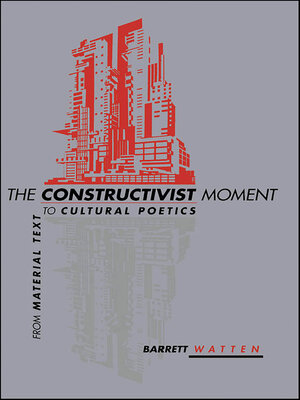
Sign up to save your library
With an OverDrive account, you can save your favorite libraries for at-a-glance information about availability. Find out more about OverDrive accounts.
Find this title in Libby, the library reading app by OverDrive.



Search for a digital library with this title
Title found at these libraries:
| Library Name | Distance |
|---|---|
| Loading... |
Winner of the American Comparative Literature Association's Rene Wellek Prize (2004)
As one of the founding poets and editors of the Language School of poetry and one of its central theorists, Barrett Watten has consistently challenged the boundaries of literature and art. In The Constructivist Moment, he offers a series of theoretically informed and textually sensitive readings that advance a revisionist account of the avant-garde through the methodologies of cultural studies. His major topics include American modernist and postmodern poetics, Soviet constructivist and post-Soviet literature and art, Fordism and Detroit techno—each proposed as exemplary of the social construction of aesthetic and cultural forms. His book is a full-scale attempt to place the linguistic turn of critical theory and the self-reflexive foregrounding of language by the avant-garde since the Russian Formalists in relation to the cultural politics of postcolonial studies, feminism, and race theory. As such, it will provide a crucial revisionist perspective within modernist and avant-garde studies.
As one of the founding poets and editors of the Language School of poetry and one of its central theorists, Barrett Watten has consistently challenged the boundaries of literature and art. In The Constructivist Moment, he offers a series of theoretically informed and textually sensitive readings that advance a revisionist account of the avant-garde through the methodologies of cultural studies. His major topics include American modernist and postmodern poetics, Soviet constructivist and post-Soviet literature and art, Fordism and Detroit techno—each proposed as exemplary of the social construction of aesthetic and cultural forms. His book is a full-scale attempt to place the linguistic turn of critical theory and the self-reflexive foregrounding of language by the avant-garde since the Russian Formalists in relation to the cultural politics of postcolonial studies, feminism, and race theory. As such, it will provide a crucial revisionist perspective within modernist and avant-garde studies.







